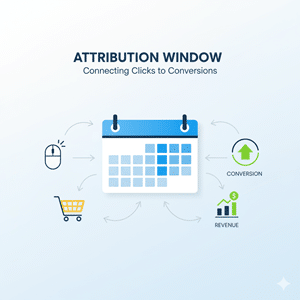Affiliate marketing operates on a performance-driven digital model, allowing individuals (affiliates or publishers) to earn commissions by promoting products or services offered by other businesses. When the affiliate prompts a particular action — typically a sale, lead, or click — they earn a payout from the advertiser or merchant.
Affiliates leverage various platforms like blogs, YouTube, social media, newsletters, and other digital channels, utilizing unique tracking links to accurately attribute conversions.
Essentially, affiliate marketing allows you to generate income by endorsing and monitoring products from others.

How Affiliate Marketing Works
- An advertiser (merchant) develops a product or service and establishes an affiliate program.
- Affiliates (publishers) Sign up for the program and get exclusive tracking links or promotional codes.
- Affiliates promote the product through their content (blogs, videos, social posts).
- When a user clicks the link and completes a qualifying action (purchase, sign-up, etc.), the sale is tracked.
- The affiliate earns a commission — either fixed or percentage-based.
All activities are monitored through cookies, pixels, or backend systems such as ShareASale, CJ, or Impact.
Key Players in Affiliate Marketing
- Merchant / Advertiser: The product owner or brand (e.g., Amazon, Bluehost, Nike).
- Affiliate / Publisher: The promoter who earns commission (e.g., bloggers, influencers).
- Affiliate Network (optional): Platform that oversees the program, such as CJ Affiliate or Rakuten.
- Customer: The final user who performs the action that leads to the commission being generated.
Popular Affiliate Payment Models
| Model | Description | Example |
| CPA (Cost Per Action) | Get paid when the user completes an action (signup, download, sale) | User signs up for a free trial |
| CPS (Cost Per Sale) | Earn a percentage of each referred sale | 10% of a $200 product = $20 |
| CPC (Cost Per Click) | Paid based on clicks, not purchases | $0.20 per ad click on your site |
| RevShare | Ongoing share of subscription revenue | 30% per month for a SaaS product |
Top Affiliate Marketing Channels
- Niche Blogs and Review Site
- e.g., “Top 10 VPNs for Remote Work”
- YouTube Product Reviews and Tutorials
- e.g., “Best budget camera under $500”
- Email Marketing
- e.g., Weekly newsletters with curated affiliate offers
- Social Media and Influencer Pages
- e.g., Instagram swipe-up links, TikTok bio links
- Coupon and Deal Websites
- e.g., “50% off with exclusive code”
Advantages of Affiliate Marketing
- Low-risk income stream: There’s no requirement to produce or inventory items.
- Scalable earnings: Showcase a variety of products on various platforms.
- Flexible business model: Can be passive or active.
- Win-win structure: Businesses attract customers, while partners earn based on results.
- Integrates with content strategy: Monetized links can be incorporated into blog posts, tutorials, and guides.
Challenges and Considerations
- Compliance and disclosures: It is essential to adhere to FTC guidelines and platform regulations, such as including ads and “affiliate link” notifications.
- Cookie duration matters: Certain programs provide payment only if the purchase is made within a 24–30-day window.
- Conversion tracking issues: Ad blockers and privacy tools may cause disruptions.
- Payout thresholds and delays: Many programs offer monthly payments once a minimum balance is achieved.
Examples of Affiliate Marketing in Practice
- Tech Blogger: Suggests laptops through Amazon affiliate links, earning a commission of 4–8% on each sale.
- Travel YouTuber: Provides booking links for hotels or equipment, earning a commission for each reservation made.
- SaaS Reviewer: Creates evaluations of SEO tools and earns ongoing income from referred signups.
- Instagram Influencer: Utilizes Bitly/Impact links in the bio for skincare products.
Affiliate Marketing vs Influencer Marketing
| Feature | Affiliate Marketing | Influencer Marketing |
| Payment | Performance-based (CPC, CPS, CPA) | Often fixed fees (per post/campaign) |
| Tracking | Unique links and real-time attribution | Harder to attribute unless linked |
| Used by | Anyone with a blog, platform, or content | Social media personalities |
| Risk to Brand | Lower (only pay when results occur) | Higher (pay upfront regardless of ROI) |
How SEO Agency Boston Supports Affiliate Marketers
Whether you’re starting your first affiliate blog or enhancing an existing niche site, SEO Agency Boston is here to assist you:
- Create effective, search-friendly content pathways that drive conversions
- Boost organic traffic that leads to commissions.
- Utilize structured data, incorporate product schema, and establish link tracking.
- Master the intricacies of compliance regulations and optimal disclosure strategies.
- Incorporate affiliate links while maintaining an optimal user experience and site performance.
We don’t merely increase traffic; we enhance affiliate income, with integrity and effectiveness.
Related Terms
- CPA (Cost Per Acquisition)
- Conversion Rate
- Referral Traffic
- Click-Through Rate (CTR)
- Monetization Strategy
FAQs About Affiliate Marketing
No, but it can be beneficial. Utilize platforms like YouTube, email lists, or social media to effectively promote your affiliate links.
It depends. Some earn $100 a month, while others exceed $10,000. Revenue is influenced by the specific market, audience engagement, and approach.
Absolutely, it’s essential to adhere to FTC regulations, clearly disclose any affiliate connections, and ensure compliance with the policies of each platform.
Absolutely. Incorporate trackable links within your video descriptions, bios, or swipe-ups, while ensuring you disclose any paid partnerships transparently.

Turn Your Audience Into Income — the Smart Way
Affiliate marketing values high-quality content, intelligent promotion, and genuine recommendations.
Looking for assistance in creating a sustainable, SEO-focused affiliate business?
Schedule a Strategy Call with the SEO Agency in Boston






